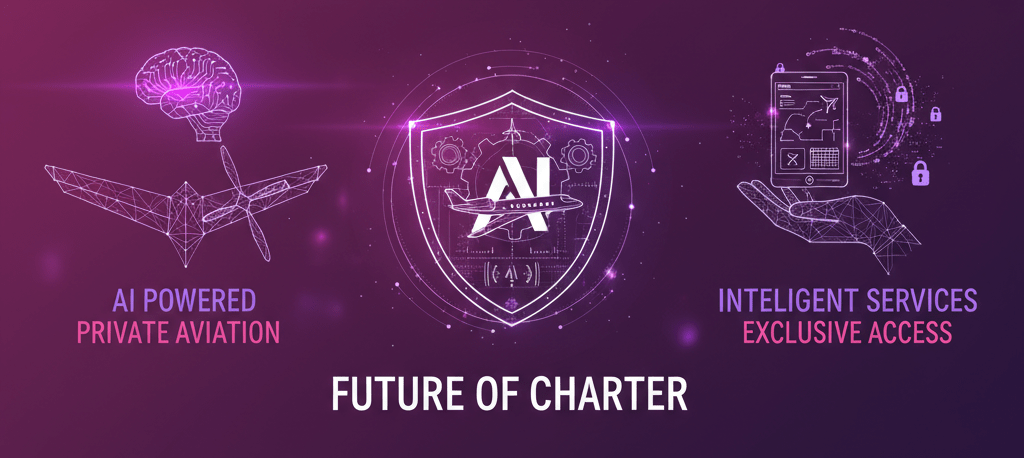“Boost sales 24/7 with AI for Private Aviation and Charter Services that instantly qualify leads, quote trips, and free human brokers for high-touch closing.”
It’s 3 AM in New York. Your entire charter sales team is asleep, and rightfully so. But in Dubai, a high-net-worth executive has just decided they need a last-minute flight to a conference in Geneva. They search for a charter service, find your website, and call the number. The call goes straight to voicemail. Disappointed by the lack of immediate service, they hang up, call your competitor, and speak to someone—or something—instantly. Within an hour, they’ve booked a $150,000 trip on a Gulfstream G650. You just lost a massive opportunity, and you don’t even know it yet.
This scenario isn’t just a hypothetical nightmare; it’s a daily reality in the ultra-competitive world of private aviation. The industry doesn’t operate on a 9-to-5 schedule. It runs on the 24/7, time-sensitive demands of the world’s most influential people. For charter brokers and operators, speed-to-lead isn’t just a buzzword—it’s the single most critical factor in capturing new business. The first professional response almost always wins the client.
The fundamental challenge is that human teams have limits. You can’t have your best brokers working around the clock without risking burnout and incurring massive overhead. Yet, every missed call, every delayed email response, is a potential multi-million dollar deal slipping through your fingers. How do you provide instantaneous, high-touch service at any hour, from any time zone, without breaking the bank? The answer lies in a technology that’s rapidly changing the landscape of luxury sales: Artificial Intelligence.
This article will break down the precise framework for building a 24/7 lead intake and qualification engine powered by AI. We will examine how this technology explicitly addresses the unique challenges and pain points of the private aviation industry. Moreover, we’ll introduce how a sophisticated tool like SalesCloser.ai can function as your company’s very own “AI Charter Coordinator,” ensuring you never miss another high-value opportunity, day or night.

The Unforgiving Nature of Private Aviation Sales
Before we dive into the solution, it’s crucial to understand the unique pressures of the market. Private aviation isn’t like selling a typical product or service. The stakes are astronomically higher, the clients are more demanding, and the window of opportunity is incredibly brief.
The Anatomy of a High-Stakes Charter Request
When a potential client reaches out, a clock starts ticking. This isn’t a casual inquiry; it’s often a time-sensitive need. Whether it’s a CEO needing to get to a critical meeting, a family planning a spontaneous vacation, or an emergency medical transport, the request comes with a built-in sense of urgency.
A typical charter request involves a flurry of information gathering:
- Origin and Destination: Where are they flying from and to? Are the airports equipped to handle the required aircraft?
- Dates and Times: When do they need to depart and arrive? Is there any flexibility?
- Passenger Count: How many people are traveling? This directly impacts aircraft selection.
- Aircraft Preference: Do they have a specific jet in mind (a Challenger 350, a Falcon 7X), or do they need guidance on the best option for their mission?
- Special Requests: What about catering, ground transportation, pet accommodations, or specific entertainment needs?
Accurately and efficiently gathering this information is the first step. Any friction in this process—a confusing web form, a full voicemail box, a slow email reply—can kill the deal before it even begins. High-net-worth clients value their time above all else; they interpret a slow response as a sign of unprofessionalism and a preview of the service they can expect to receive.
Why the “Golden Minute” Matters More Than the “Golden Hour”
In many sales industries, experts discuss the “golden hour”—the first 60 minutes after a lead is received. Responding within this window dramatically increases your chances of conversion. In private aviation lead generation, that window is compressed into the “golden minute.” The moment a client decides to book, they are actively looking for a solution. They will contact multiple providers, and the first one to deliver a professional, comprehensive, and confident response will earn their trust and their business.
Think about the psychology of a luxury buyer. They are not just purchasing a flight; they are purchasing convenience, efficiency, and peace of mind. A delayed response communicates the exact opposite. It introduces doubt and suggests your operation might not be as seamless as they require. Consequently, the ability to engage, qualify, and begin the quoting process within seconds of the initial inquiry is a decisive competitive advantage.
The 24/7 Global Client Conundrum
Your clients are global citizens. They operate across multiple time zones. A request can come from a London-based banker at midnight their time, which is early evening in New York. An entrepreneur in Singapore might be planning a trip while your Los Angeles office is closed. Relying on a single-time zone office schedule means you are effectively closed for business to a significant portion of the world at any given time.
This isn’t just about charter requests. FBO service inquiries, pilot communications, and logistical updates also happen around the clock. The entire ecosystem of private aviation operates 24/7. Your sales and client service front door needs to be, too. Staffing a global, 24/7 human team is a logistical and financial nightmare. It requires multiple shifts, international hiring, and complex management structures. It’s an expensive solution to a problem that technology is now perfectly poised to solve.
The Old Way vs. The New Way: Automating Your Front Line
For years, the industry has relied on a handful of methods for lead capture, all of which have significant flaws in the modern, on-demand world. It’s time for a new approach.
The Traditional Lead Funnel: A Leaky Bucket
Let’s be honest about the traditional process. A potential client finds you and decides to reach out. What happens next?
- The Phone Call: If it’s during business hours, a broker might answer. If they are on another call or busy, it goes to voicemail. The lead now has to wait for a callback, and in the meantime, they are already calling your competitor. If it’s after hours, voicemail is the only option, which can result in a significant delay.
- The Web Form: The client fills out a form on your website. This leads to a general email inbox. It sits there, waiting for someone to see it, read it, decide who should handle it, and finally respond. This process can take hours, even during the business day. Overnight, it’s a guaranteed deal-killer.
- The Direct Email: A client sends an email to your main sales address. Just like the web form, it enters a queue. Its priority is unknown until a human opens it.
Each of these steps is a potential leak in your sales funnel. Every minute of delay increases the likelihood that the lead will go cold or be claimed by a more responsive competitor. You are asking your most valuable potential customers to wait in line, a concept that is entirely foreign to them in every other aspect of their lives.
The AI-Powered Funnel: Sealing the Leaks
Now, imagine a different scenario. A potential client calls your number at any time of day or night.
- Instant Engagement: An AI-powered agent answers the phone immediately on the first ring with a professional, custom-branded greeting.
- “Thank you for calling Apex Jet Charters. My name is Alex, your dedicated AI charter coordinator. To provide you with an accurate quote, I just need to ask a few quick questions about your trip.”
- Guided Qualification: The AI then walks the caller through the key questions we discussed earlier—origin, destination, dates, passengers, and preferences—in a natural, conversational manner.
- Intelligent Routing: Based on the answers, the AI instantly qualifies the lead. It can identify the urgency, potential value, and specific needs of the trip.
- Seamless Handoff: The AI then takes the appropriate next step. It might schedule a call directly on a senior broker’s calendar for the morning, or, if the request is straightforward, it can package all the collected information and feed it directly into your charter broker software to automate flight quoting.
In this model, there are no leaks. Every lead is captured, engaged, and qualified in real-time, 24/7. The client receives the immediate, professional interaction they expect, and your sales team comes in to find perfectly qualified, high-intent leads waiting for them.
More Than a Chatbot: The Power of Conversational AI
It’s essential to distinguish the technology we’re discussing from the simple, text-based chatbots commonly found on many websites. Those are often clunky, frustrating, and limited to pre-programmed text responses.
Modern conversational AI, especially a platform like SalesCloser.ai, is fundamentally different. It’s built for high-stakes, nuanced conversations.
- It Understands Voice: Many high-net-worth clients prefer to make a phone call. It’s faster and more direct. A proper AI solution must be able to handle inbound calls, understand human speech with all its variations, and respond with a natural-sounding voice.
- It Follows Complex Logic: The AI isn’t just matching keywords. It can be programmed with a sophisticated “playbook” that guides the conversation. It knows which questions to ask, in what order, and how to react to different types of answers.
- It Integrates Deeply: The AI doesn’t just live on your website. It connects to your core business tools—your CRM, calendar, and quoting software—to enable meaningful action.
This is not a simple robot. This is a digital team member trained to be the perfect first point of contact for your business.
Your AI Charter Coordinator in Action: A Step-by-Step Framework
Let’s move from theory to practice. How would you actually implement an AI for private aviation and charter services? Here is a practical, step-by-step framework showing how an AI agent can revolutionize your lead qualification and quoting process.
Step 1: The Instantaneous Handshake (Answering the Call 24/7)
The first impression is everything. When a client calls, the AI answers instantly. No ringing out, no voicemail, no automated “press 1 for sales” menu. Just a crisp, professional greeting that immediately establishes credibility.
Example Script: AI: “Good evening, thank you for contacting Sovereign Air Group. This is Kai, your automated charter specialist. I can help gather the details for your trip to provide you with an immediate quote. Are you looking to book a flight today?”
This “instantaneous handshake” immediately sets you apart. The client knows they’ve reached a responsive and technologically advanced company. This simple act of answering the phone builds immediate trust and keeps them on the line.
Step 2: Intelligent Triage & Information Gathering
Once engaged, the AI’s primary job is to collect the essential data points needed for a quote. It does this conversationally, not by running through a robotic checklist.
Example Conversation:
Client: “Yes, I need to get from Teterboro to Van Nuys sometime next week.”
AI: “Of course. Teterboro to Van Nuys is a prevalent route for us. Do you have a specific departure date in mind for next week?”
Client: “I’m thinking Tuesday, the 21st.”
AI: “Tuesday, October 21st. Got it. And how many passengers will be traveling with you?”
Client: “There will be six of us.”
AI: “Excellent, six passengers. For a trip of that length, we typically recommend a super-midsize jet, such as a Citation Latitude, or a heavy jet, like a Gulfstream G450, for added comfort and convenience. Do you have a preference, or would you like us to include options for both in the proposal?”
Notice how the AI isn’t just asking questions; it’s also providing answers. It offers helpful context (“a prevalent route for us”) and demonstrates expertise (“we would typically recommend…”). This builds the client’s confidence in your operation. The AI continues this process to gather all necessary details: return dates, catering needs, and other special requests.
Step 3: The Art of Qualification (Separating Shoppers from Buyers)
Not all inquiries are created equal. Some are from serious buyers ready to book now, while others are from “tire kickers” just shopping for prices. A key role of your AI Charter Coordinator is to qualify charter requests, helping your human team prioritize intelligently.
The AI can do this in several subtle ways:
- Detecting Urgency Signals: The AI can be trained to recognize keywords and phrases that signal high intent, such as “last minute,” “I need to book this tonight,” or “we have an urgent meeting.” When it hears these, it can flag the lead as high-priority.
- Asking Budgetary Questions (Delicately): Approaching the topic of budget can be awkward, but it’s essential. The AI can handle this gracefully.
- “To ensure we present the most suitable aircraft that aligns with your expectations, our proposals typically range from $45,000 for a super-midsize jet to $70,000 for a heavy jet on this route. Does that range work for you?” This helpfully frames the budget question, qualifies the lead’s financial capacity, and manages expectations from the start.
- Identifying Red Flags: The AI can also spot signs of a low-quality lead. Suppose a caller is evasive, refuses to provide a name or contact information, or offers conflicting details. In that case, the system can flag them as low-priority, preventing your top brokers from wasting time on them.
Step 4: The Seamless Handoff (Scheduling or Quoting)
After gathering and qualifying the information, the AI executes the final, critical step: the handoff. This is where the true power of luxury sales automation shines. The AI will take one of two paths based on the rules you set.
Path A: The High-Priority Handoff (Schedule a Call)
If the AI identifies a high-value, high-intent lead (e.g., a complex multi-leg trip or a client who expressed extreme urgency), its goal is to connect them with a human expert as soon as possible.
AI: “Thank you for that information. For a multi-city trip like this, I recommend speaking directly with one of our senior charter advisors to optimize the itinerary. I see that our specialist, Jessica, is available tomorrow at 9:15 AM your time. Would you like me to book that consultation for you?”
If the client agrees, the AI integrates directly with Jessica’s calendar, sends a meeting invitation to both parties, and populates the meeting notes with a full transcript and summary of the call. Jessica arrives the next morning to find a perfectly qualified, high-value lead already on her calendar.
Path B: The Information-to-Quote Handoff (Automate the Quote)
If the request is straightforward (e.g., a simple one-way trip from a known client), the goal may be to deliver a quote as quickly as possible.
AI: “Excellent, I have all the details I need to build your proposal. I am sending this information to our quoting system right now. You can expect a full proposal with several aircraft options in your inbox within the next 15 minutes. What is the best email address to send that to?”
The AI then packages all the collected data—passenger count, route, dates, preferences—into a structured format and sends it via API directly to your quoting software. This triggers the process to automate flight quoting, getting a proposal to the client while their buying intent is at its peak, all without any human intervention.
The Tangible Business Impact: Beyond Just Answering Calls
Implementing an AI Charter Coordinator is not just an operational tweak; it’s a strategic move that delivers measurable results across your entire business.
Never Miss a Multi-Million Dollar Opportunity Again
This is the most evident and powerful benefit. Every single inquiry that comes in—whether by phone at 3 a.m. on a Tuesday or via web form on a Sunday afternoon—is captured and responded to instantly. The financial upside is immense. Closing just one or two extra-heavy jet charters per year that you would have otherwise missed can deliver a massive return on investment, paying for the technology many times over. You transform your lead capture from a “sieve” into a “vault,” securing every opportunity.
Dramatically Improve Client Response Time
In the luxury market, service is speed. By reducing your initial response time from hours to seconds, you fundamentally change the client experience. This has a powerful effect on your brand perception. You are perceived as efficient, modern, and highly responsive—qualities that are essential for engaging high-net-worth clients. This builds loyalty and generates referrals, creating a virtuous cycle of growth. Clients will remember the company that answered instantly and delivered a quote while they were still on the phone.
Free Up Your Human Experts for High-Value Work
Your best charter brokers are your most valuable assets. Their expertise lies in building relationships, navigating complex logistics, and closing intricate deals. Their time should not be spent on repetitive, low-level tasks, such as asking the same five qualifying questions over and over.
By deploying an AI to handle this initial screening process, you free up your human team to focus exclusively on what they do best. They can spend their time nurturing key accounts, managing complex trips, and proactively reaching out to past clients. The AI handles the “quantity” of inbound leads, allowing your team to focus on the “quality” of their interactions. This leads to higher job satisfaction, less burnout, and ultimately, more revenue per broker.
Gain Actionable, Data-Driven Insights
Every conversation the AI has is a data point. Over time, this creates an incredibly rich dataset about your market demand. Your AI becomes a source of business intelligence, allowing you to answer critical strategic questions:
- What are the most requested routes during after-hours inquiries?
- What time of day do we get the most inquiries from the Asia-Pacific region?
- What percentage of leads are pre-qualified on budget before speaking to a human?
- What are the most common special requests that we could standardize as an offering?
This data is invaluable for optimizing your marketing spend, adjusting your sales strategy, and making informed decisions about fleet availability or key FBO partnerships.
Why SalesCloser.ai is the Perfect “AI Charter Coordinator”
While the concept of AI in sales is broad, SalesCloser.ai is a platform specifically designed for the high-stakes, conversational sales process that characterizes the private aviation industry. It is not a generic chatbot retrofitted for a new purpose.
- Designed for Complex, High-Value Conversations: SalesCloser.ai is built to handle the nuance and complexity of a luxury sale. Its conversational abilities extend far beyond simple Q&A, enabling the kind of sophisticated qualification and rapport-building necessary to engage a discerning clientele.
- Voice-First Philosophy: The platform acknowledges that, in private aviation, the phone remains the primary means of communication. Its best-in-class voice AI ensures that clients who call have a seamless, natural, and productive conversation, which is critical for 24/7 booking for private jets.
- Seamless Integration: An AI is only as powerful as the actions it can take. SalesCloser.ai is designed to integrate deeply with the tools you already use. It can push data into your CRM, schedule meetings on your calendars, and send structured information to your quoting platforms, creating a truly automated workflow.
- Fully Customizable and Brand-Aligned: Your brand has a unique voice and a specific sales process. The AI’s scripts, tone, and logic are fully customizable to match your company’s identity. It becomes a valid extension of your team, consistently representing your brand with professionalism and precision on every single call.
Conclusion: Securing Your Place in the Future of Private Aviation
The private aviation industry is built on three pillars: speed, precision, and impeccable service. Historically, delivering all three on a 24/7 global scale has been a monumental operational challenge. Human limitations and time zones created unavoidable gaps in service, and in those gaps, multi-million dollar opportunities were lost.
Today, AI-powered conversational technology provides the solution. By implementing an AI Charter Coordinator, you are not replacing your talented human team. You are augmenting them. You are equipping them with a tireless digital partner that ensures no lead is ever missed, every client receives an instant response, and your top brokers can focus their energy on the high-value relationships that drive your business forward.
The choice is becoming increasingly apparent. You can continue to operate with the “leaky bucket” of traditional lead management, hoping that high-value calls only come in during business hours. Or, you can seal the leaks, embrace the future of luxury travel sales, and ensure that the next 3 AM call from Dubai is not a missed opportunity, but the start of your next central booking.
Frequently Asked Questions (FAQs)
Q1: Will my clients know they’re talking to an AI? Won’t that feel impersonal?
We recommend transparency. The AI can introduce itself as an “automated assistant” or “AI coordinator.” The key is that the experience is so efficient and professional that clients appreciate the immediacy of it. A flawless, instant interaction with an AI is far better than waiting six hours for a human. The goal isn’t to trick the client; it’s to provide them with the fastest possible path to a solution. The high-quality, conversational nature of platforms like SalesCloser.ai makes the interaction feel helpful and natural, not robotic.
Q2: Can the AI handle complex or unusual requests, like trips with multiple stops or unique security needs?
The AI’s primary role is to be the first line of response—to qualify and triage incoming information. It is programmed to recognize the limits of its script. When a request becomes too complex or falls outside its programmed parameters (e.g., medical transport, diplomatic clearance, or highly unusual cargo), its protocol is to escalate the matter immediately. It will recognize the complexity and execute the handoff to a human specialist, saying something like, “That’s a more complex itinerary that would be best handled by one of our senior flight planners. I can schedule a call for you immediately.”
Q3: How does the AI integrate with our current charter broker software and CRM?
Top-tier AI platforms, such as SalesCloser.ai, are built with integration in mind. They utilize APIs (Application Programming Interfaces) to connect and share data with other software applications. This allows the AI to, for example, retrieve a client’s history from your CRM to personalize the conversation, and then update the CRM and your quoting software (such as Avinode, Wyvern, or a proprietary system) with the new trip details to automate the next steps. The setup is typically handled during the implementation process to ensure a seamless workflow.
Q4: Is this system secure for handling the sensitive data of high-net-worth clients?
Security is paramount. Reputable AI providers use enterprise-grade security protocols, including end-to-end encryption for all conversations and data storage. They are compliant with data privacy regulations like GDPR and CCPA. When vetting a provider, always inquire about their security architecture and data handling policies to ensure they meet the high standards required for handling confidential client information.
Q5: What does the implementation process look like? How long does it take to get started?
Implementation is faster than most people think. The process typically involves:
- Discovery: The AI provider works with you to understand your current sales process, brand voice, and qualification criteria.
- Playbook Design: They help you script the ideal conversations and logic flows for your AI Charter Coordinator.
- Integration: They connect the AI to your existing phone systems, CRM, and other relevant software.
- Testing & Launch: You test the system internally before it goes live to ensure it can handle fundamental client interactions. A standard implementation can often be completed in just a few weeks, not months.
Q6: Can the AI speak multiple languages to handle our international clientele?
Yes. Modern conversational AI can be trained to communicate fluently in multiple languages. This presents a significant advantage for charter services targeting a global market. You can provide the same instant, professional service to a client speaking Mandarin, Arabic, Spanish, or French, further expanding your reach and making your service accessible and welcoming to a broader range of high-net-worth individuals.






